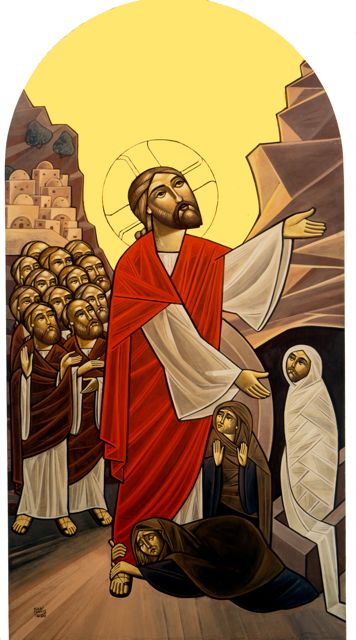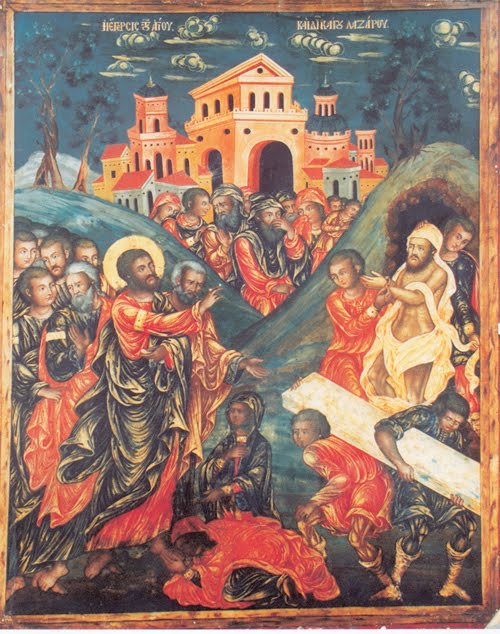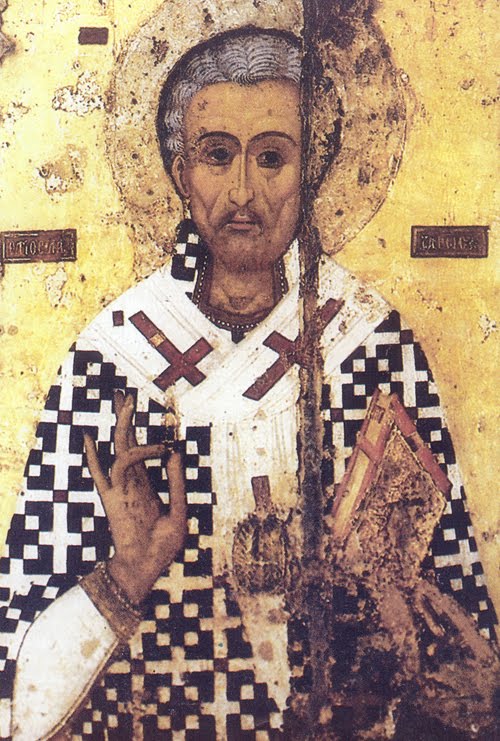St. Lazarus the "One Whom Jesus Loved" - Possible He Wrote the 4th Gospel?
Concerning the issue, I was made aware of something that another individual noted on the issue of who authored the Book of John - in regards to St. Lazarus.
One prominent scholar in the world of NT Studies - known as Ben Witherington - had a very insightful thesis on the issue of what Lazarus, which others can discover if going here to
Ben Witherington: Was Lazarus the Beloved Disciple?
Ben Witherington has always been
one of my favorite authors - very astute when it comes to his analysis of Scripture and Biblical history....and one of the individuals coming heavily against much of the Primative Restorationist camps saying all aspects of Apostolic Christianity/Ancient Church are automatically "pagan"...
But on his analysis, I thought it was definitely fascinating to consider when thinking on the ways that it's assumed "the disciple whom Jesus loved" somehow connected with John. And I think Ben Witherington has the strongest case present on why Lazarus is to be considered. For Witherington argues, largely from internal evidence, that Lazarus was the "beloved disciple" in the Fourth Gospel and was responsible for writing what would be equated to the "first draft" of the book. I like considering the fact that Lazarus resolves A LOT of problems with the text since it would explain the heavy focus on Jerusalem in the Book of John and relative ignorance of Galilee as well (as Galilee is right outside of Jerusalem) - and it would explain the omission of the transfiguration and garden prayer scenes that are present in the other stories. Moreover, it would explain the reasons why it was assumed that the Beloved Disciple would not die (John 21)—because he had already once been brought back from the dead by Jesus. In light of where there has been continual use of the phrase “the disciple whom Jesus loved” (John 13:23-25, 19:26-27, 20:1-10, 21:1-25), we have to acknowledge the high significance of where John 11:5 specifically states that Jesus loved Lazarus.
I liked how another summed it up, as
seen in the following (for brief excerpt):
Firstly, the beloved disciple is never equated with John the son of Zebedee in the fourth Gospel. Instead, the sons of Zebedee are mentioned in John 21.2 do not seem to be equated with the beloved disciple. Secondly, the apostle John was, like Jesus’ other disciples, a Galilean. However, the fourth Gospel includes only one of the major Galilean miracles which the synoptics include (the feeding of the 5000 in John 6). If the beloved disciple was an eyewitness from Galilee, we would expect more of Jesus’ Galilean miracles to be included. Thirdly, in the synoptic gospels, all of the twelve abandon Jesus at his crucifixion. However, in John, we are told that the beloved disciple was present at the crucifixion. If John (one of the twelve) and the beloved disciple are the same, then we have to solve the discrepancy. If, however, the beloved disciple was Lazarus, not one of the twelve, then the discrepancy disappears. Fourthly, the first appearance of an expression similar to “the disciple that Jesus loved” appears in John 11 when Jesus is told: “he whom you love is ill” (Jn. 11.2). This is a reference not to the apostle John, but to Lazarus. If this is a precursor to “the disciple that Jesus loved” then it would suggest that this beloved disciple is in fact Lazarus, and not John. Fifthly, in John 18, it seems that the beloved disciple is known by the high priest. This would be highly unlikely if the beloved disciple was a Galilean. Rather, this suggests that this disciples was well known in the Jerusalem area. Lazarus lived in Bethany, which was just by Jerusalem. It would make more sense for this disciple to be Lazarus if the high priest knew him.
Sixthly, Lazarus as the beloved disciple could help to explain the incredibly high christology of John. If you had been dead for 4 days and then raised by Jesus, that would change your worldview in a very dramatic way. This could account for the boldness with which the fourth Gospel proclaims Jesus as God, as opposed to the more cryptic way the synoptics suggest it.
Other great places for discussion:
There has been ongoing debate on the issue that has continued to take place. More can be seen in the following:
Of course, the most glaring issue to consider (in opposition to Lazarus as the disciple whom Jesus loved) is that it would be hard to reconcile how he was at the last supper. However, something that I had never considered before was that it was not JUST the disciples at the last Supper - for there were women there as well. In fact, Mark’s gospel indicates Jesus asked two disciples to prepare the Passover meal and then Jesus “came with the Twelve” (Mark 14:13-17). Logically, that would mean that at least fifteen people
attended the Last Supper: Jesus, tw
o disciples and “the Twelve”. In light of the fact that the Lord had male and female disciples - as well as the fact that meal preparation was a role that women fulfilled traditionally - it could easily have ben the case that the two disciples attending the Last Supper could have been women (or at least ONE of the disciples being a woman and another being male as an assistant - Lazarus being a brother to someone like Martha, that dynamic would not be far-fetched ). Having women as assistants is not hard to consider - in light of how we read
Matthew 27:55: "Many women were there, watching from a distance. They had followed Jesus from Galilee to care for his needs." (more noted in Luke 8:1-3) .....and as it concerns the company of women, we already see key events where women were present - as seen in one of them being someone who anointed the Lord for burial BEFORE he broke bread. More was shared in the thread entitled
Matthew 26:6-13 - Anointings of Yeshua by Women and seeing what were they about? ....The image most people read with is one where the Lord is simply with men - but that imagery can skew dealing with the other facts. Something else to consider is that all four of the Gospels record Christ being anointed by a woman using perfume - with Judas complaining that the perfume is too expensive, whereas Jesus affirms what the woman is doing, saying that she is anointing him for his burial. While the Synoptic Gospels don't give identification to who the woman is, the fourth Gospel points out that it's Mary and the place she did the event at was Bethany. Logically, this would make sense for the author to make these identifications since Mary is Lazarus’ sister and Bethany is where they lived.
http://www.kylemcdanell.com/2013/10/rethinking-identity-of-beloved-disciple.html

As it concerns the article from the beginning by Ben Witherington, I do ask that others read through the article first/all the rebuttals given BEFORE speaking since it will help everyone be on the same page with what's actually being advocated with Lazarus as the author of John. I would hate for others to come into the thread speaking past what the intent of the OP is - but that has happened before in other places. Hopefully, it will not here - but with that said, if anyone has any thoughts on the matter, I'd love to hear. Blessings....








